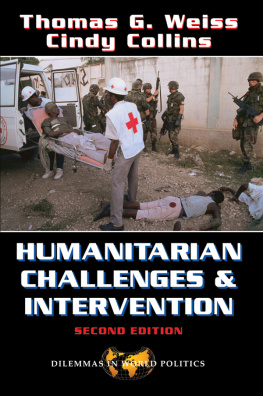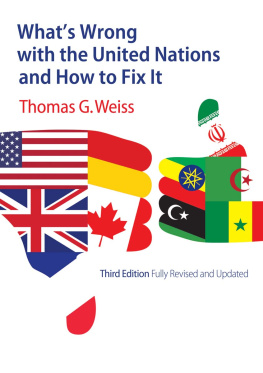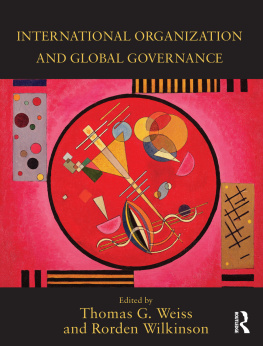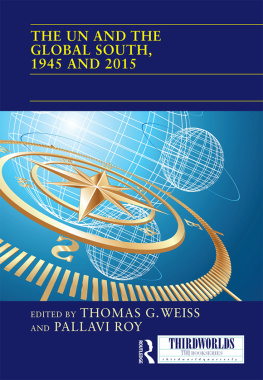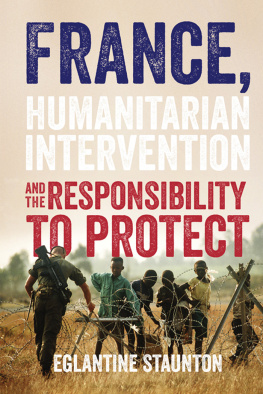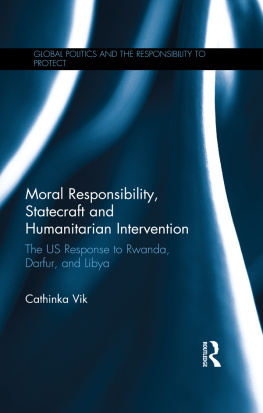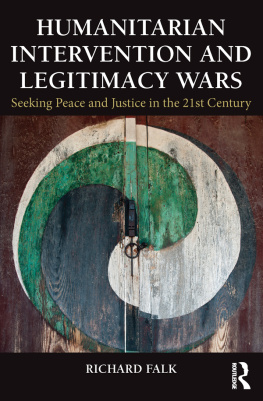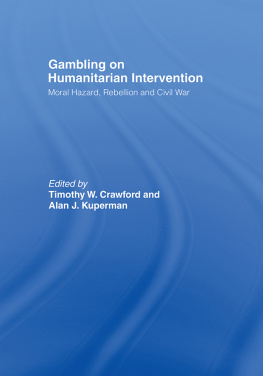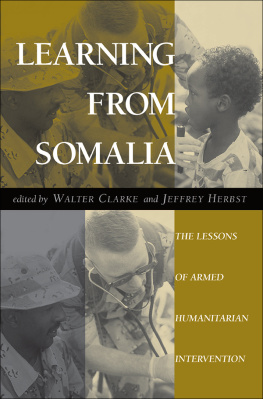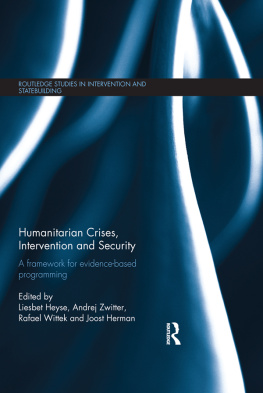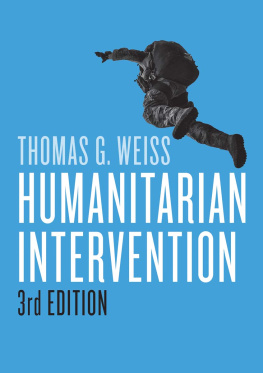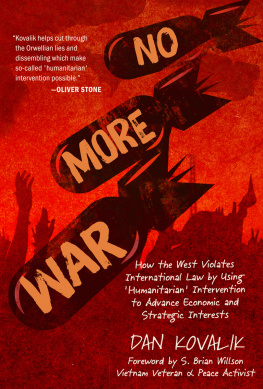Humanitarian Challenges and Intervention
DILEMMAS IN WORLD POLITICS
Series Editor
George A. Lopez, University of Notre Dame
Dilemmas in World Politics offers teachers and students in international relations a series of quality books on critical issues, trends, and regions in international politics. Each text examines a "real world" dilemma and is structured to cover the historical, theoretical, practical, and projected dimensions of its subject.
EDITORIAL BOARD
Jeffry Frieden
Harvard University
Deborah J. Gerner
University of Kansas
Vicki Golich
California State UniversitySan Marcos
Lev Gonick
Wilfrid Laurier University
Barbara Welling Hall
Earlham College
Elizabeth C. Hanson
University of Connecticut
Barry B. Hughes
University of Denver
Janice Love
University or South Carolina
Vincent Mahler
Loyola of Chicago
Zeev Maoz
Tel Aviv University
Karen A. Minqst
University of Kentucky
Frederic Pearson
Wayne State University
V. Spike Peterson
University of Arizona
Neil Richardson
University of WisconsinMadison
Martin Rochester
University of MissouriSt. Louis
Geora Sorensen
Aarhus University (Denmark)
Harvev Starr
University of South Carolina
Michael Stohl
Purdue University
Douglas Stuart
Dickinson College
Donald Sylvan
Ohio State University
Sarah J. Tisch
Winrock International
John Vasquez
Vanderbilt University
BOOKS IN THIS SERIES
Humanitarian Challenges and Intervention, Second Edition
Thomas G. Weiss and Cindy Collins
The European Union: Dilemmas of Regional integration
James A. Caporaso
The United nations in the Post-Cold War Era, Second Edition
Karen A. Mingst and Maigaret F. Karns
International Futures: Choices in the Face of Uncertainty ; Third Edition
Barry B, Hughes
Global Gender Issues, Second Edition
V. Spike Peterson and Anne Sisson Runyon
International Human Rights, Second Edition
Jack Donnelly
Democracy and Democratization in a Changing World, Second Edition
Georg Srensen
Revolution and Transition in East-Central Europe , Second Edition
David S. Mason
Ethnic Conflict in World Politics
Ted Robert Gurr and Barbara Harff
Dilemmas of Development Assistance
Sarah J. Tisch and Michael B. Wallace
East Asian Dynamism, Second Edition
Steven Chan
FORTHCOMING
Dilemmas of International Trade , Second Edition
Bruce E. Moon
Global Environmental Politics, Third Edition
Gareth Porter, Janet Brown, and Pamela Chasek
One Land, Two Peoples , Third Edition
Deborah Gerner
Russia and the World
Andrew C. Kuchins
Humanitarian Challenges and Intervention
SECOND EDITION
Thomas G. Weiss
THE GRADUATE CENTER, THE CITY UNIVERSITY OF NEW YORK
Cindy Collins
DEPARTMENT OF POLITICAL SCIENCE, BROWN UNIVERSITY
Dilemmas in World Politics
First published 2000 by Westview Press
Published 2018 by Routledge
711 Third Avenue, New York, NY 10017, USA
2 Park Square, Milton Park, Abingdon, Oxon OX14 4RN
Routledge is an imprint of the Taylor & Francis Group, an informa business
Copyright 2000 Taylor & Francis
All rights reserved. No part of this book may be reprinted or reproduced or utilised in any form or by any electronic, mechanical, or other means, now known or hereafter invented, including photocopying and recording, or in any information storage or retrieval system, without permission in writing from the publishers.
Notice:
Product or corporate names may be trademarks or registered trademarks, and are used only for identification and explanation without intent to infringe.
Library of Congress Cataloging-in-Publication Data
Weiss, Thomas George.
Humanitarian challenges and intervention / Thomas G. Weiss, Cindy Collins.2nd ed.
p. cm. (Dilemmas in world politics)
Includes bibliographical references and index.
ISBN 0-8133-6799-9
1. International relief. 2. War victimsServices for. 3. World politics1989-
I. Collins, Cindy. II. Title. III. Series.
HV553.W425 2000
362.870526dc21
00-039875
ISBN 13: 978-0-8133-6799-6 (pbk)
Tables
Figures
Boxes
Maps
Photographs
Cartoons
Authors should always ask themselves whether a second edition of a book is necessary. In regard to this particular book, several colleagues who regularly have used the text in the classroom urged us to prepare a new edition, commenting that although they still found the first edition useful in their courses, it was in need of updating. Much has occurred in the years since the publication of the first edition, including the most recent annus horribilis, 1999. Humanitarian intervention remains at least as central to American and international politics as it was in 1995, when the first edition was written. The first humanitarian air war, waged in Kosovo, and the first full-fledged U.N. trusteeship, after the catastrophe in Timor, were sufficient to take us back to our word processors.
These two events signaled an end to "Vietmalia syndrome"the American hesitancy to get involved militarily overseas, a long-standing consequence of the more than 50,000 fatalities in Southeast Asia (not to mention the 18 body bags from the humanitarian mission in Mogadishu). Today the deployment of U.S. forces for humanitarian ends remains a policy option in crises around the world. As Joseph Nye wrote shortly after returning to his academic position at Harvard, following a stint in Washington as assistant secretary of defense: "Such crises raise moral concerns that the American people consistently include in their list of foreign policy interests. Policy experts may deplore such sympathies, but they are a democratic reality." Students of international relationsboth as students and as citizensshould be aware of the difficult issues involved in deciding whether to undertake military humanitarian action.
Thus, the central purpose of this new and expanded edition remains to synthesize for our readers the insights that we have gained through field research and analysis in recent years. The 1990s have witnessed an increasing emphasis on human rights and humanitarian values. As we go to press, events once again have demonstrated the intimate but seemingly bizarre link between the hardheaded and hardhearted application of force usually associated with "realists" in textbooks, ana the supposedly softheaded and softhearted application of norms usually associated with "idealists." This last year of the millennium has confirmed a long-term trend redefining certain humanitarian norms and crises as being sufficiently intertwined with national interests to justify rigorous action on behalf of victims.


